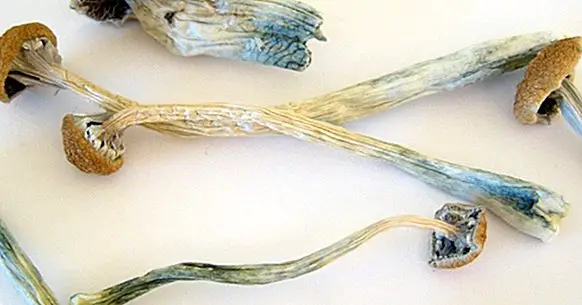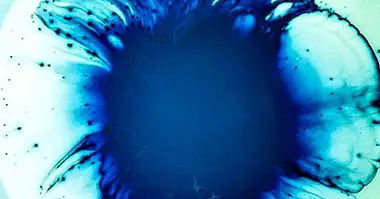Psilocybin: definition and effects of this component of the hallucinogenic mushrooms
The functioning of the human brain is highly complex, and this implies that a wide variety of substances and chemical elements participate in it. Normally, these tiny compounds work in a coordinated manner, maintaining a certain balance in mental processes. However, there are some substances that, when they come from outside the organism, completely alter the functioning of neurons.
Psilocybin is one of those compounds which, when entering the nervous system, deeply affect its overall functioning. Specifically, it is famous for its psychoactive effect.
In this article we will see what psilocybin is, what its effects are and why the hallucinogenic mushrooms that contain it have become popular.
- Related article: "Hallucinogenic mushrooms: these are their effects in our mind"
What is psilocybin?
Psilocybin is an alkaloid that is found naturally in certain types of mushrooms , which are known to be hallucinogenic mushrooms.
The consumption of these mushrooms as a recreational drug it is due to its hallucinogenic effects, which lead many people to ingest the mushrooms for the mere interest that these experiences arouse; Some users define it as dreaming or becoming aware of other realities, using a lexicon linked to mysticism.
However, the effects of psilocybin need not be explained by mentalistic and dualistic beliefs. In fact, although it is not known exactly what happens when this substance enters the brain, the basic mechanisms by which they cause transient syndromes based on hallucinations are known. Let's see it
- Maybe you're interested: "Types of drugs: know their characteristics and effects"
How does it work in the brain?
The brain is, in part, made up of neurons, which communicate with each other exchanging a series of chemicals called neurotransmitters . The quantity and temporality with which a neuron receives different types of neurotransmitters determines what will be its activation pattern, which in turn will be "passed in chain" to other nerve cells that will end up releasing neurotransmitters, etc.
Psilocybin causes at least one of these neurotransmitters, serotonin, to have more intense effects on certain neurons. Let's say that this psychoactive compound has a serotonin agonist effect, since it causes more neuronal receptors to trigger a type of activation that should only be given when this substance is present in normal amounts.
The fact that these neurons receive orders from serotonin that are untimely and they do not start from the equilibrium that the organism maintains, it makes hallucinations appear.
The effects of psilocinin
The main effects of psilocybin they start between 15 and 50 minutes after orally consuming the substance (Although it also depends on the state of the stomach), and can last up to 8 hours. They are the following.
Change the perception of time
There are studies that suggest that among the common effects of this psychoactive substance is experimentation different from the passage of time, causing it to pass faster or slower than normal, or even creating moments of confusion when giving the impression that has entered a temporary loop.
Expands neuronal connectivity
Psilocybin makes parts of the brain that are usually not very connected to each other start exchanging signals more frequently. This makes the quality of the perception of the environment change completely.
It is, on a large scale, something that closely resembles what happens in people with synesthesia, a phenomenon by which sensory modalities mix with each other, for example, making certain sounds are perceived while evoking the perception of a different color for each of them.
Specifically, some of the parts of the brain that show signs of greater connectivity are the hippocampus and the cingulate cortex, areas linked to the storage of memories belonging to declarative memory, on the one hand, and to the experimentation of emotions and the creation of plans, on the other.
- You may be interested: "Parts of the human brain (and functions)"
Causes hallucinations
It is the central feature of psilocybin as an element belonging to psychoactive drugs. These hallucinations they can be visual, auditory, tactile and of all kinds .
- Related article: "Hallucinations: definition, causes, and symptoms"
Generate mystical experiences
The hallucinations that occur with psilocybin are not simple "movies" to which the consumer attends as a spectator.On many occasions the person who has eaten hallucinogenic mushrooms is emotionally involved with what I see, hear and touch, to the point of believing that everything is as or more real than what he lived before taking the drug.
This causes some of the hallucinations to be interpreted as divine revelations , or breakages of reality, through which another alternative reality appears.
Its long-term effects: personality changes
There is evidence that the consumption of psilocybin is capable of producing permanent changes in the mental processes of the consumer. Specifically, changes in personality. Normally these changes are linked to a tendency to curiosity about the new , probably motivated by the experiences related to hallucinations.
Does it have therapeutic potential?
Research is currently being conducted to explore the potential therapeutic potential of psilocybin and other hallucinogenic compounds and drugs such as LSD. However, because of its recent nature (until recently, in many countries it was not allowed to investigate in this line), there are still no conclusive results, although there are reasons to believe that these resources may be useful in clinical practice in the future .



















